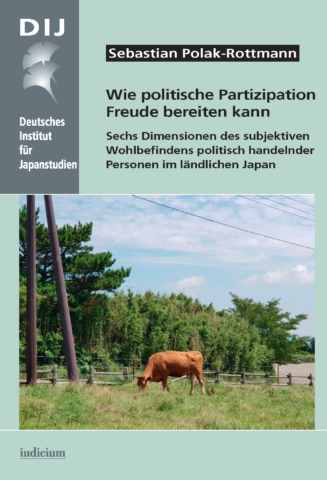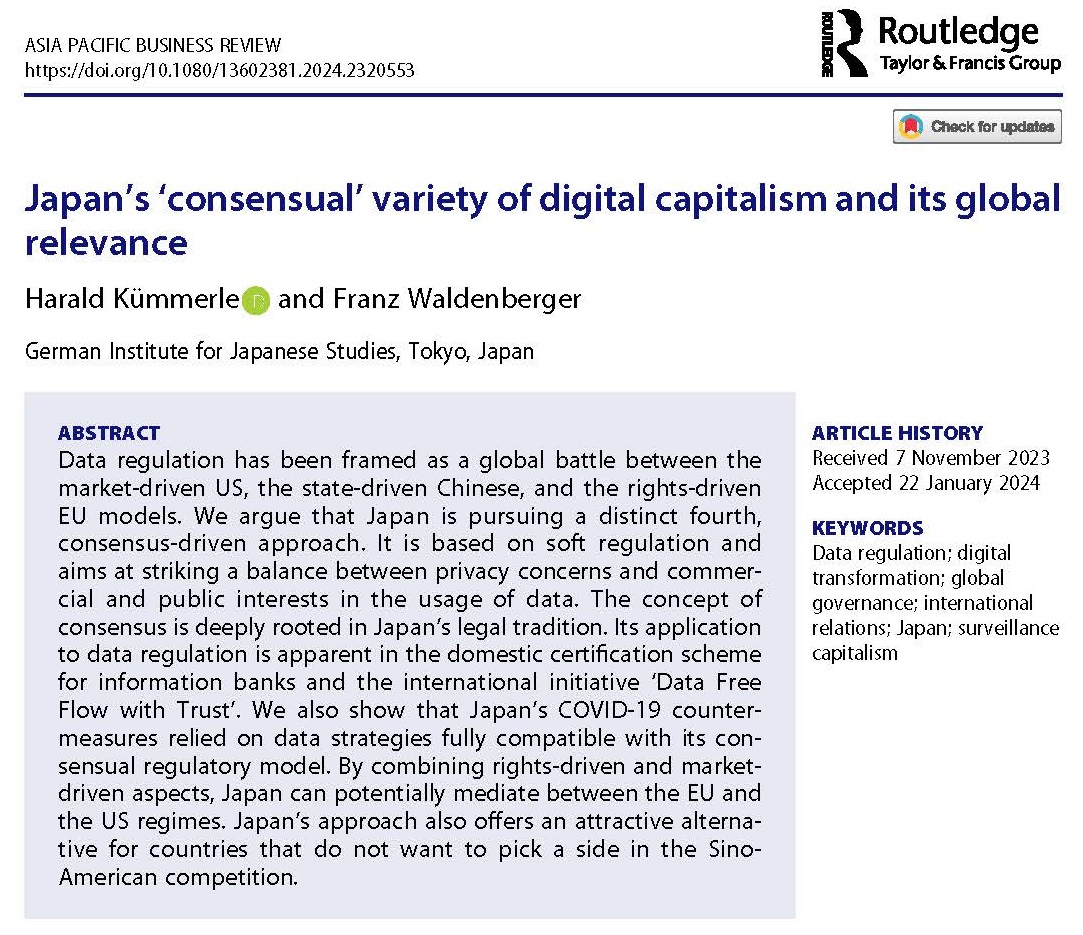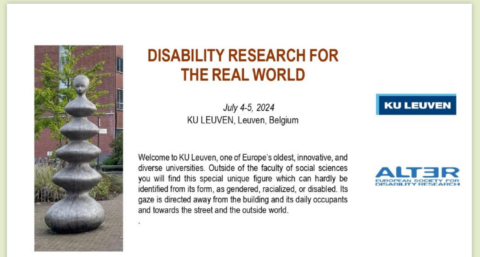Events and Activities
New DIJ Monograph studies political participation and well-being in rural Japan

What motivates people to get involved in politics in their free time? How can they derive pleasure from it? In this new book publication (in German), DIJ political scientist Sebastian Polak-Rottmann analyses how people in rural Japan try to change local society through a variety of activities, such as agricultural, political, and social work. Based on extensive fieldwork in Southern Japan’s city of Aso (Kumamoto prefecture), he concludes that mutual enjoyment is a core element of the well-being of politically active people in rural Japan. Giving pleasure to others through activities therefore leads to a positive experience for both sides involved. With this reciprocal understanding of well-being, this book builds on relational concepts of happiness and embeds them in a new model that focuses on the connections between spatial, social, every day, individual, procedural, and temporal contexts. Wie politische Partizipation Freude bereiten kann (How political participation can be enjoyable) is published by Iudicium as volume 67 in the DIJ Monograph series.
New journal article discusses Japan’s digital capitalism and its global relevance
 A new journal article by DIJ researcher Harald Kümmerle and DIJ director Franz Waldenberger studies Japan’s consensus-driven approach to data regulation as an alternative to the market-driven US, the state-driven Chinese, and the rights-driven EU models. The authors argue that Japan’s approach is based on soft regulation and aims at striking a balance between privacy concerns and commercial and public interests in the usage of data. They also show that Japan’s COVID-19 countermeasures relied on data strategies fully compatible with its consensual regulatory model. By combining rights-driven and market-driven aspects, Japan can potentially mediate between the EU and the US regimes. Japan’s approach also offers an attractive alternative for countries that do not want to pick a side in the Sino-American competition. “Japan’s ‘consensual’ variety of digital capitalism and its global relevance” was published in Asia Pacific Business Review (online first).
A new journal article by DIJ researcher Harald Kümmerle and DIJ director Franz Waldenberger studies Japan’s consensus-driven approach to data regulation as an alternative to the market-driven US, the state-driven Chinese, and the rights-driven EU models. The authors argue that Japan’s approach is based on soft regulation and aims at striking a balance between privacy concerns and commercial and public interests in the usage of data. They also show that Japan’s COVID-19 countermeasures relied on data strategies fully compatible with its consensual regulatory model. By combining rights-driven and market-driven aspects, Japan can potentially mediate between the EU and the US regimes. Japan’s approach also offers an attractive alternative for countries that do not want to pick a side in the Sino-American competition. “Japan’s ‘consensual’ variety of digital capitalism and its global relevance” was published in Asia Pacific Business Review (online first).
Carolin Fleischer-Heininger to present paper at Disability Research Conference
 DIJ researcher Carolin Fleischer-Heininger will give a presentation on her latest research on representations of disabilities in contemporary Japanese literature at the 12th Alter Conference ‘Disability Research for the Real World’ at KU Leuven on July 5. Her presentation “Transgression as emancipation: Redefining disability in Hanchibakku (2023) by Ichikawa Saō” analyzes disabilities in the short novel Hanchibakku with particular regard to interpersonal relations, sexuality and natality. She shows how dependencies that are often a formative experience in disabled people’s lives get outlined and discusses the protagonist’s desire to become pregnant and abort the unborn child as an articulation of tensions regarding dominant perceptions about disabled people and their lives. Carolin’s presentation demonstrates that the novel encourages reflections about imbalances and indicates the possibility of revising current realities and working towards a more humane future. Details and programme here
DIJ researcher Carolin Fleischer-Heininger will give a presentation on her latest research on representations of disabilities in contemporary Japanese literature at the 12th Alter Conference ‘Disability Research for the Real World’ at KU Leuven on July 5. Her presentation “Transgression as emancipation: Redefining disability in Hanchibakku (2023) by Ichikawa Saō” analyzes disabilities in the short novel Hanchibakku with particular regard to interpersonal relations, sexuality and natality. She shows how dependencies that are often a formative experience in disabled people’s lives get outlined and discusses the protagonist’s desire to become pregnant and abort the unborn child as an articulation of tensions regarding dominant perceptions about disabled people and their lives. Carolin’s presentation demonstrates that the novel encourages reflections about imbalances and indicates the possibility of revising current realities and working towards a more humane future. Details and programme here
Hybrid Study Group on Southeast Asia and hedging strategies
![]() Southeast Asia faces the conundrum that its largest economic benefactor China is also a geopolitical challenger to the region’s cohesion and rules-based order. How do Southeast Asian states balance their economic interests and security interests? What is the role of the Free and Open Indo-Pacific Vision (FOIP) and Belt and Road Initiative (BRI) in that balancing process? How can we conceptualize these balancing actions using hedging? Using Cheng-Chwee Kuik’s hedging framework, this presentation comparatively investigates how Southeast Asian states hedge against China by leveraging the FOIP vision and BRI to secure strategic autonomy. This research finds that the competitive nature of Sino-Japanese relations, as manifested in the interaction between the BRI and FOIP, provides Southeast Asian states extra regional assets to lessen the contradictions that exist between the beneficial economic interactions with China and its geopolitical challenges. Details and registration here
Southeast Asia faces the conundrum that its largest economic benefactor China is also a geopolitical challenger to the region’s cohesion and rules-based order. How do Southeast Asian states balance their economic interests and security interests? What is the role of the Free and Open Indo-Pacific Vision (FOIP) and Belt and Road Initiative (BRI) in that balancing process? How can we conceptualize these balancing actions using hedging? Using Cheng-Chwee Kuik’s hedging framework, this presentation comparatively investigates how Southeast Asian states hedge against China by leveraging the FOIP vision and BRI to secure strategic autonomy. This research finds that the competitive nature of Sino-Japanese relations, as manifested in the interaction between the BRI and FOIP, provides Southeast Asian states extra regional assets to lessen the contradictions that exist between the beneficial economic interactions with China and its geopolitical challenges. Details and registration here
Nicole M. Mueller to give presentation on Thomas Mann reception in Japan
 No less than 15 retranslations of Thomas Mann’s Tonio Kröger were published in Japan between 1927 and 2018. How do they differ and what do the differences tell us about changes in Japanese society and culture? In her presentation “Japanese Thomas Mann Reception between Cultural Heteronomy and Emancipation – 100 Years of Japanese Tonio Kröger Retranslation in the Mirror of Digital Topic Modelling” (in German) at the spring meeting of the Japanese Society for German Studies on June 9, Nicole M. Mueller will focus on the relationships of similarity and influence between the different texts. Using a specially developed digital analysis tool based on topic modelling, she shows that the different translation variants are located in specific historical contexts, which also reflect inter- and intra-cultural relationships of influence and power. The lecture will present first insights into Nicole’s forthcoming book on the same topic.
No less than 15 retranslations of Thomas Mann’s Tonio Kröger were published in Japan between 1927 and 2018. How do they differ and what do the differences tell us about changes in Japanese society and culture? In her presentation “Japanese Thomas Mann Reception between Cultural Heteronomy and Emancipation – 100 Years of Japanese Tonio Kröger Retranslation in the Mirror of Digital Topic Modelling” (in German) at the spring meeting of the Japanese Society for German Studies on June 9, Nicole M. Mueller will focus on the relationships of similarity and influence between the different texts. Using a specially developed digital analysis tool based on topic modelling, she shows that the different translation variants are located in specific historical contexts, which also reflect inter- and intra-cultural relationships of influence and power. The lecture will present first insights into Nicole’s forthcoming book on the same topic.
‘The Ends of War’: onsite DIJ Forum on Modernity and World War II
 Please note: this event is fully booked. Registration is no longer possible. Looking back upon the extra-long twentieth-century that begins in the latter half of the nineteenth century and that continues today, it has become increasingly clear that “freedom” is not necessarily the antithesis of oppression and domination. Instead, “freedom” has too often been the condition for the workings of power. One of the most obvious examples in modern Japan is the Japanese empire’s promise to free those in the Asia-Pacific from the bonds of Euro-American colonialism and racism. This relation between the promise of freedom and new oppressions has been a recurring theme in modern history throughout the world. This talk grapples with this question through the example of Japanese history, including during the Second World War, while discussing the complicity of freedom with the oppressions that have accompanied nationalism, imperialism, colonialism, the “emperor system,” and various forms of social discrimination. This DIJ Forum (onsite only) is the first event in the Max Weber Foundation event series ‘The Ends of War’, commemorating the 80th anniversary of the end of World War Two. Details here
Please note: this event is fully booked. Registration is no longer possible. Looking back upon the extra-long twentieth-century that begins in the latter half of the nineteenth century and that continues today, it has become increasingly clear that “freedom” is not necessarily the antithesis of oppression and domination. Instead, “freedom” has too often been the condition for the workings of power. One of the most obvious examples in modern Japan is the Japanese empire’s promise to free those in the Asia-Pacific from the bonds of Euro-American colonialism and racism. This relation between the promise of freedom and new oppressions has been a recurring theme in modern history throughout the world. This talk grapples with this question through the example of Japanese history, including during the Second World War, while discussing the complicity of freedom with the oppressions that have accompanied nationalism, imperialism, colonialism, the “emperor system,” and various forms of social discrimination. This DIJ Forum (onsite only) is the first event in the Max Weber Foundation event series ‘The Ends of War’, commemorating the 80th anniversary of the end of World War Two. Details here
Joint DIJ and DWIH workshop on interconnections of sustainability
 The workshop “Building a Sustainable Future: Integrating Consumption, Finance, and Education” delves into the interconnected issues of sustainability, sustainable consumption, sustainable finance and education. Collectively, they form a holistic approach to creating a more balanced and resilient world. Sustainable consumption encourages mindful choices to minimize waste and environmental impact, while sustainable finance directs capital toward environmentally friendly and socially responsible investments. Together, they create a powerful framework that fosters innovation, promotes responsible resource management, and drives positive social and environmental outcomes, paving the way for a sustainable and prosperous future. This one-day in-person workshop, jointly organized by the DIJ and the German Center for Research and Innovation (DWIH) Tokyo, brings together eights experts who will share they views and latest research on different aspects of sustainability. Details and registration here
The workshop “Building a Sustainable Future: Integrating Consumption, Finance, and Education” delves into the interconnected issues of sustainability, sustainable consumption, sustainable finance and education. Collectively, they form a holistic approach to creating a more balanced and resilient world. Sustainable consumption encourages mindful choices to minimize waste and environmental impact, while sustainable finance directs capital toward environmentally friendly and socially responsible investments. Together, they create a powerful framework that fosters innovation, promotes responsible resource management, and drives positive social and environmental outcomes, paving the way for a sustainable and prosperous future. This one-day in-person workshop, jointly organized by the DIJ and the German Center for Research and Innovation (DWIH) Tokyo, brings together eights experts who will share they views and latest research on different aspects of sustainability. Details and registration here
Celia Spoden presents research on avatar robots at international symposium in Kyoto
 DIJ researcher Celia Spoden will present latest results from her research project Cyber-physical spaces and avatar technologies: new opportunities for an inclusive society? at the International Symposium ‘Participation (Un)plugged: Exploring Dignity and Disability through Human-Robot Interaction’ at Ritsumeikan University in Kyoto on May 19. Her paper “An alter ego in the classroom: Potential and limitations of avatar robots for hospitalized children or children with disabilities” is one of four presentations at the symposium that will explore how the digital space — where people, objects, and information intersect — can reshape notions of ‘personhood’ and ‘dignity’. Participation is possible online and onsite. Details and registration here
DIJ researcher Celia Spoden will present latest results from her research project Cyber-physical spaces and avatar technologies: new opportunities for an inclusive society? at the International Symposium ‘Participation (Un)plugged: Exploring Dignity and Disability through Human-Robot Interaction’ at Ritsumeikan University in Kyoto on May 19. Her paper “An alter ego in the classroom: Potential and limitations of avatar robots for hospitalized children or children with disabilities” is one of four presentations at the symposium that will explore how the digital space — where people, objects, and information intersect — can reshape notions of ‘personhood’ and ‘dignity’. Participation is possible online and onsite. Details and registration here





 Open Access
Open Access
